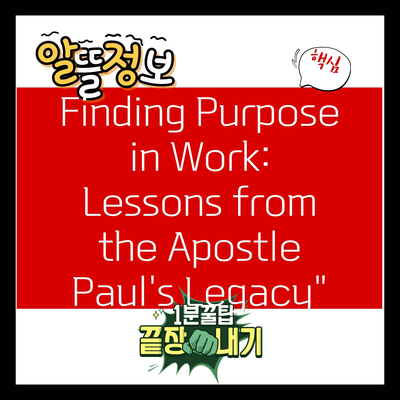
Understanding the Earnings of Apostle Paul and Its Modern Relevance
The Apostle Paul, a pivotal figure in early Christianity, is often lauded not just for his profound theological insights but also for his unique approach to work and income. His life, teachings, and writings continue to resonate deeply with contemporary audiences, prompting reflections on the balance between faith and livelihood. Drawing parallels from his experiences to current societal norms offers a lens through which we can examine our understanding of work, faith, and personal fulfillment.
Paul’s Approach to Work and Income
Apostle Paul was not only a missionary and a theologian; he was also a skilled tentmaker. This profession, as documented in Acts 18:3, allowed him to support himself financially while spreading the message of Christ. His work ethic and self-sufficiency illustrate a deep conviction in contributing to communal and personal welfare. Paul believed that dignity in labor was essential, reflecting his conviction that he should not be a financial burden to those he ministered to.
One of the core messages Paul propagated was the importance of work as a means of serving not only oneself but also the community. This concept of
Modern Interpretations of Paul’s Earnings
In today’s socio-economic landscape, the relevance of Paul’s work ethic is profound. As many grapple with job dissatisfaction or a lack of purpose in their careers, returning to Paul’s example offers inspiring alternatives. The contemporary workforce frequently debates the merits of passion versus profit, often leading individuals to a state of disillusionment. However, Paul’s model suggests embracing a dual approach where faith and
Furthermore, Paul’s unwillingness to depend solely on the financial support of churches he established speaks volumes about his character. Protecting the integrity of his ministry was as vital as the message he spread. Today, this is echoed in calls for ethical labor practices and corporate responsibility, where individuals and businesses are encouraged to prioritize social impact along with economic gains.
Challenges Faced by Modern Workers
Many people today often face challenges that mirror those of Paul, such as job insecurity, ethical dilemmas at work, or the struggle to balance personal beliefs with professional requirements. The importance of resilience, as seen in Paul’s unwavering commitment to his mission despite adversities, serves as a beacon of hope for those navigating similar struggles. Individuals can draw strength from his assurance that their value isn’t solely defined by their economic circumstances but also by their contributions to society and their alignment with their spiritual convictions.
Implications for Personal Development
Paul’s legacy extends beyond mere financial independence; it encapsulates growth through spiritual and personal development. Modern workers can find meaning in their vocations by seeking out ways in which their careers align with their values. This intersection of profession and
Conclusion: Embracing Paul’s Work Ethic Today
The Apostle Paul’s approach to work and income is as relevant now as it was in his time. His commitment to self-sufficiency while ministering effectively highlights a profound understanding of the relationship between faith and labor. Today’s workforce is encouraged to draw inspiration from his life, aligning their professional pursuits with their personal and spiritual values. Embracing a sense of laborious stewardship can propel individuals towards a career that is not only financially viable but also spiritually enriching.
As we reflect on the life and teachings of the Apostle Paul, may we find renewed purpose in our work and strive to make positive impacts in our lives and the communities we inhabit. This timeless legacy urges us towards a balanced and fulfilling approach to income and life—where every job can become a vocation steeped in faith, service, and community spirit.


